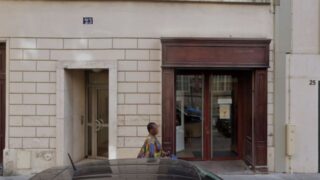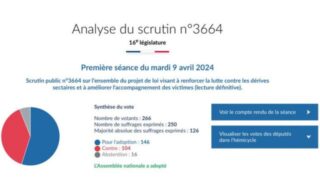A scholarly article notes how in France “political power can be weaponized against minority religions with the backing of the state.”
by Massimo Introvigne


Donald A. Westbrook from San Jose State University has emerged in recent years as the most notable exponent of a new generation of scholars who specialize in the study of Scientology without focusing primarily on court cases and controversies but on the daily life of ordinary Scientologists. Books by Westbrook on Scientology have been published by both the main international academic publishers, Oxford University Press and Cambridge University Press.
This does not mean that Westbrook is uninterested in controversies. He has just published an article in the peer-reviewed “International Journal for the Study of New Religions” (the issue is dated 2021 but, due to COVID-related delays, has been released only this month). The title is, “The War Is Not Over: Scientology, Resilience, and the Resurgence of State-Sponsored Anti-Cultism in France.” The journal is not open access, and you need to pay a fee of £23 to download the article.
In the first part of the study, Westbrook presents the fascinating story of the Church of Scientology in France, which is not generally known even to scholars of new religious movements. Westbrook interviewed before he died in 2016 the founder of the first Scientology organization established in Paris in 1959, renowned French-Egyptian classical pianist Mario Feninger. Even before Feninger’s association, called “Friends of Scientology,” was established, books by L. Ron Hubbard had been promoted in France by an American called Jack Campbell (not to be confused with John W. Campbell, the editor of the magazine “Astounding Science Fiction” where Hubbard published his first article on Dianetics). Westbrook also interviewed Scientologists who, after so many years, still recalled how impressed they were by Feninger’s “powerful presentations.”


More well-known is the subsequent institutional history of Scientology in France, with the establishment of different organizations up to the present situation, with six churches and five missions operating in the country. Westbrook summarizes it, and also emphasizes how important is for French Scientologists the imminent opening of a large “Ideal Organization” in Paris’ suburb of Saint-Denis. Those he interviewed are persuaded it will mark the beginning of a new era for Scientology in France.
They also hope the new era will be peaceful, but this cannot be taken for granted. Quoting previous research by Susan Palmer, Bernadette Rigal-Cellard, and the undersigned, Westbrook reconstructs the history of the anti-cult movement in France and the support it has received from various governmental agencies, the most recent of which is the MIVILUDES, the French Mission for Monitoring and Combating Cultic Deviances. Westbrook notes that Scientology has always been a main target of these organizations, whose actions “are often predicated on ideas about ‘mind control’ and ‘brainwashing’ that have been long been criticized as exaggerated and misleading if not outright pseudoscientific.”
It seemed for a while that the activity of MIVILUDES was losing momentum, as France was more preoccupied with Islamic radicalism and terrorism than with “cults.” However, in recent years some French politicians have jumped again on the anti-cult bandwagon, and revamped and re-financed MIVILUDES, from where money largely flows to private anti-cult organizations. The result, Westbrook concludes, is that today “MIVILUDES poses a threat to not only minority religions but other individuals and groups that are deemed undesirable or unorthodox.”
In the last part of the article, Westbrook examines a specific case of anti-cult politician, Sonia Backès, the current French Secretary of State for Citizenship, whose portfolio includes overseeing the MIVILUDES, and whom he calls a “political anti-Scientologist.” Backès presents herself as a “survivor” of Scientology and tells the story that she almost miraculously escaped from the “cult” at age 12. Westbrook notes however that he could “find no evidence that Secretary Backès ever spoke out against, or even about, Scientology in her public life prior to assuming her current position (and, even then, only after the July 2022 death of her mother, who was a long-time Scientologist).”


The American scholar reports that “Bitter Winter” first debunked Backès’ story by interviewing her brother. In turn, Westbrook interviewed her stepfather, who “corroborated the account of the brother and filled in a number of other details, all supported by evidence such as photographs, text message screenshots, and other documents.” These documents confirm that Backès was not estranged from her Scientology relatives before her mother’s death as she claims. They kept a good relationship, and the stepfather reports that in 1999, several years after she had left the church, during a trip to Florida “Backès even visited Clearwater (home of Scientology’s international Flag base) and met with a Scientologist friend visiting from Paris.”
Backès also claims that Scientology recruited her mother by taking advantage of her “vulnerability… in the middle of a divorce,” while documents made available to Westbrook show that she concluded the divorce proceedings in 1982 and joined the church in 1984. Backès told interviewers that she was enrolled in an educational institution called School of Awakening, run by Scientologists, which is true, but adds that while she was studying there, “the School of Awakening was shut down by the authorities… It was the action of the public authorities that saved me.” This is false, Westbrook comments, as the school continued to function for at least ten years after Backès left it. Equally false is the story of her adventurous “escape” from Scientology. When she said she wanted to live with her non-Scientologist father in New Caledonia, her mother and stepfather simply bought her a ticket to go there.
Whether Backès is a “compulsive liar,” as her stepfather told Westbrook, or is a victim of the MIVILUDES system, who forced her to rewrite her personal history to survive in the competitive French politics, is a question that scholars are not equipped to answer. For Westbrook, it is much more interesting to note that Backès may be just the first of a new category of “apostate” ex-members of new religious movements, those who use their (real or imaginary) past as “victims of a cult” to further a political career.
“What truly makes Backès’ apostate narrative unique, writes Westbrook, is her background as a second-generation (former) Scientologist who is in a position of political power to damage her (former) religion—for instance by speaking out to the media, shaping public policy and action over MIVILUDES, and, perhaps most pointedly, voicing opposition to the new ‘Ideal Org’ church in Saint-Denis.” Of course, the American scholar adds, we should not forget that Backès “publicly emerged as a second-generation disgruntled ex-Scientologist only ‘after’ assuming an office over MIVILUDES, the very organization responsible for monitoring so-called ‘cults’ such as Scientology.”
Perhaps Backès invented a new form of political anti-cultism, Westbrook concludes. Others may try to imitate her. While this may be good for their political careers, provided they do not exaggerate with lies that may be easily exposed, it will certainly be bad for freedom of religion or belief.









